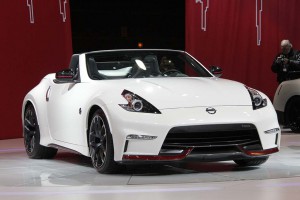Using technologies as diverse as 3D printing and connected car services, Nissan hopes to soon let buyers extensively customize their vehicles – both new ones and those they already own.
The new approach could put Japan’s second-largest carmaker at the forefront of the rapidly growing automotive aftermarket, a business that generates almost $40 billion a year in the U.S. alone, according to the Specialty Equipment Marketers Association, or SEMA.
This new effort, which Nissan is calling “hyper-personalization” could soon allow motorists to add customized body panels and fabric designs, as well as bring new levels of high-tech infotainment services and safety gear into their vehicles, according to Kent O’Hara, the Nissan Motor Co. vice president who manages global aftermarket sales.
(Nissan going Rogue with Star Wars-themed SUV. Click Here to check it out.)
“Nissan has a clear plan to develop its aftersales business by leading the industry in delivering the latest technology to our customers around the world,” said the Tennessee-based O’Hara, during a news conference at Nissan headquarters in Yokohama. “This strategy is about giving our customers more choices and new services to make the ownership experience better.”
The company also should benefit, according to O’Hara, as the hyper-personalization effort is expected to “open up new revenue streams for the company.” By 2025, the new approach is expected to account for a full 25% of after-sales revenues at Nissan.
Customization is a big business, as was clearly demonstrated at the annual “SEMA Show,” the aftermarket industry’s annual convention in Las Vegas earlier this month. Several thousand vendors were on hand, offering everything from fuzzy dice to hang on a car’s mirror to high-performance engines and accessories.
But the aftersales industry is now beginning to embrace advanced technologies that would permit even more individual customization, such as a body panel or seat fabric that could be uniquely shaped and printed with the face of a family member, friend or football logo. Among the technologies that would permit this is so-called 3D printing, which allows mathematical data to be transformed into solid materials.
(Click Here to check out the new Nissan Sentra NISMO.)
New electronic systems also are allowing motorists to choose from an array of in-vehicle services, features and functions, much as they already can update smartphones by downloading new apps. In some cases, updated safety systems could be added to an existing vehicle by installing new software that accesses existing vehicle hardware – or by adding new sensors.
According to O’Hara, the connected car services will be handled through Nissan dealers, starting in Japan and India, with other countries to follow by 2020.
“It’s reasonable to assume that the synergies identified at the global level exist in many markets around the globe,” a senior Nissan official told TheDetroitBureau.com on background, when asked if the United States will adopt a similar approach to hyper-personalization. But specific plans for the U.S. have not yet been locked into place.
Nissan is by no means the only automaker looking to cash in on the aftermarket business – or looking to take customization to new levels. Major manufacturers have ramped up their presence at the SEMA Show in recent years and expanded their aftermarket operations. Fiat Chrysler Automobiles, for example, has been setting up separate facilities near key assembly plants where its MOPAR parts division now can modify many of its models right off the line.
Meanwhile, several start-up manufacturers – such as Arizona-based Local Motors – are developing ways to create vehicles entirely through 3D printing. It is unclear, however, if the technology has yet reached the point where it can meet customer expectations and federal regulations while also being cost-effective enough to support a business case.
But most experts believe that, going forward, the demand for increased vehicle customization will help manufacturers distinguish themselves and boost their bottom lines.
“When car manufacturing was in its infancy, customers could have any color they wanted as long as it was black,” said Nissan’s O’Hara. “Now we are taking manufacturing to the next level of sophistication. Our customers want cars that are tailored to their lifestyles and aspirations. The ultimate goal is hyper-personalization.”
(Nissan looks to fuel sales growth with new ad campaign. For more, Click Here.)



